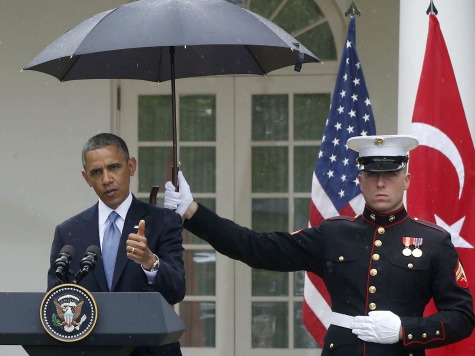
Fred Hof, the career diplomat who led the US response for much of the Syrian crisis, slammed President Obama this weekend for his “strategically appalling” response to Syria’s alleged use of chemical weapons. Hof, who last year was tasked by then Sec. of State Hillary Clinton and Obama to lead US negotiations to resolve Syria’s civil war, said Obama’s last-minute switch to seek Congressional approval for a military strike in Syria undermined US authority in the world.
“By not making it clear from the outset of the crisis that he would seek the approval of the Senate and House for a military response to the Assad regime’s chemical atrocity,” Hof wrote, “the president’s jarring change of direction now runs the risk of thoroughly undermining whatever remains of allied confidence in his leadership.”
Hof writes that, “the events of the past ten days suggest that there was no administration forethought to the possibility of a major chemical incident in Syria; there was no plan in place to respond to a major chemical attack by a regime that had already demonstrated its deep and abiding contempt for the president and his red lines.”
Hof argues that Obama’s recent actions would lead many to believe that the decision to seek Congressional approval “is less a bow to American constitutionality than a further attempt to kick the can down the road.”
Obama didn’t seek Congressional approval for the military action he authorized in Libya. That action was directed at toppling the regime of Libyan dictator Gadaffi, a more intense and much broader objective than Obama says he wants in Syria. In his remarks on Saturday, Obama even stated that he believes he has the authority to order a strike on Syria. That he didn’t, Hof argues, nor call Congress immediately back to Washington, undermines US credibility in the world.
Hof is not some outside expert observing the seen from afar. He joined the Obama Administration at the start of the President’s first term as a special advisor of the Middle East. He worked closely with Clinton and Special Envoy George Mitchell on Middle East peace negotiations. He was the lead diplomat for issues related to Syria and Lebanon.
In March, 2012, President Obama elevated him to the rank of Ambassador and gave him responsibility for handling the US response to the deteriorating situation in Syria. He abruptly resigned the position just 6 months later. News of his resignation came just two works after the murder of Ambassador Chris Stevens and three other Americans in Benghazi, Libya.
Hof’s critique of the Obama Administration is must reading for anyone trying to understand America’s increasingly feckless response to the events unfolding in Syria. Almost a year ago, President Obama told reporters that Syria’s use of chemical weapons was a “red line” that, if crossed would generate a US military response. It seems inconceivable that no contingency plans were draw up for just such an event. Yet, as Hof argues, that seems to be the case.
Congress doesn’t return to Washington until next week. Even if strong support builds for military intervention, it will likely be several days before Congress approves action. This gives the Assad regime at least two weeks to prepare for any possible US attack. The regime is no doubt, even today, moving its chemical weapons arsenal to unknown locations. The limited engagement Obama claims he wants may be completely ineffective.
As Hof laments, “there will be no ‘do-overs.'”

COMMENTS
Please let us know if you're having issues with commenting.